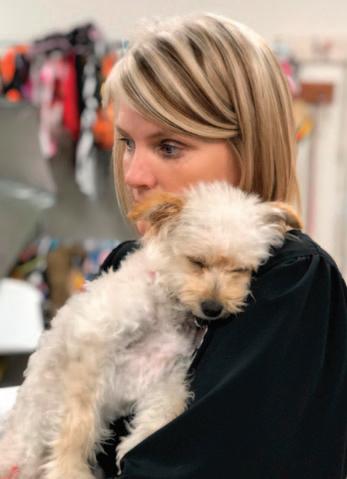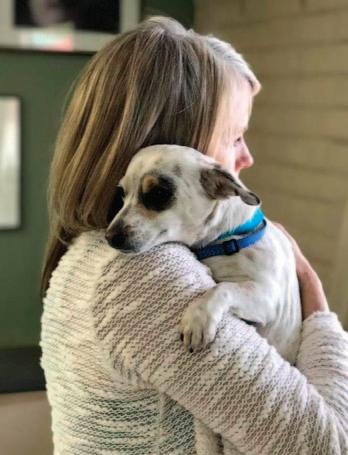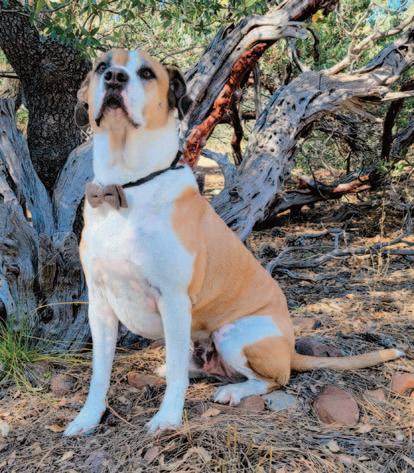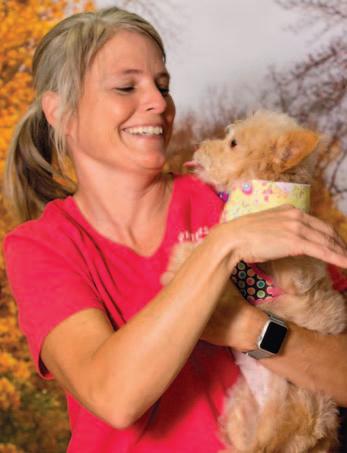
3 minute read
Fostering: The Lifeline for Rescues
Saving Lives And Improving Adoptability
By Amy DeYoung
Advertisement
Animal shelters are overworked, underfunded, and suffer from a lack of space to take in all the animals in desperate need of a home. Bari Mears, president and founder of the Phoenix Animal Care Coalition, also known as PACC911, shares, “There are more animals in need than there are places to put them. Fostering is the answer to saving many more lives.” with dogs running on the roads at risk of being hit by cars, becoming dehydrated, starving to death, or burning their paws on scalding asphalt. Even for shelters with space, it can take up to 48 hours before the shelter can assist the dog in need. Foster parents fill this void by taking in animals, so they don’t end up returning to vagrancy.
Trisha Houlihan, executive director of Saving Paws Rescue AZ, shares, “Currently, we are about 50/50 with dogs in foster care and those in our care. For us, that is 60 to 70 dogs in foster care which means that many lives are being saved by fosters.”


What fostering means
A preventable rise in euthanasia
Mears also shares that Maricopa County has experienced massive growth, with over 4.4 million people now living in this one county, yet additional shelter capacity hasn’t been added in decades. Unfortunately, this mismatch of an increasing number of humans and animals without an increase in shelter capacity has led to a rise in the euthanasia of many animals who would otherwise be adoptable. Dogs that aren’t accepted into shelters are sometimes turned back out on the streets. This often ends tragically
Being a foster parent means opening your home to an animal in need while they wait to be adopted. Daily tasks like feeding, walking, and loving them are all included in this critical job.
Fostering is essential because many of these dogs have never lived in a home. The opportunity to live in a home, get socialized, and be assessed to see if additional training is needed before being adopted are all critical factors. These aren’t achieved as easily when a dog is kept in a kennel until being adopted.
Foster parents also help the adoption process by providing information about the foster dog’s personality, likes and dislikes, and what kind of pet parent they would get along with best. For example, knowing if a dog is skittish around other animals or children makes a significant difference in the adoption’s success.
Becoming a foster
If you’re interested in fostering an animal in need, know that each rescue facility has unique requirements and ways they support foster parents. Most will pay for necessary expenses like medical care or food while you’re taking care of the animal. Foster commitments vary from a few days to several months, depending on the animal’s needs and adoption status.
If you already have dogs or other animals in your home, don’t let this stop you from applying to become a foster parent. Many foster parents have a mixed household of their pets and foster animals. The number of dogs a foster parent can take in at once is determined by the shelter’s policies, as well as the foster’ s household and experience.
One factor that may affect how many animals you can take in is the size of the animals. For example, if you’re fostering German Shepherds, you may only be allowed to foster one or two, whereas some facilities may be okay with one foster parent caring for three small dogs.
Alternative ways to help If you cannot foster animals, there are many other ways you can help. Spaying and neutering your pets are essential for reducing the number of stray animals in need. You may also consider donating money, time, or needed supplies to animal shelters and rescues, and let your county officials know that expanding shelter capacity is a crucial issue you would like to see addressed.
Truly a lifeline
Mears sums it up, “The more people that willingly foster animals, the better job shelters can do because the existing shelters do not have enough space to house everyone, and animals are being euthanized because of this. Fostering is the lifeline for rescues.” W
Amy DeYoung is an Arizona native and freelance writer who spends her free time baking, reading, and chasing after her Boston Terrier, Nickel.












